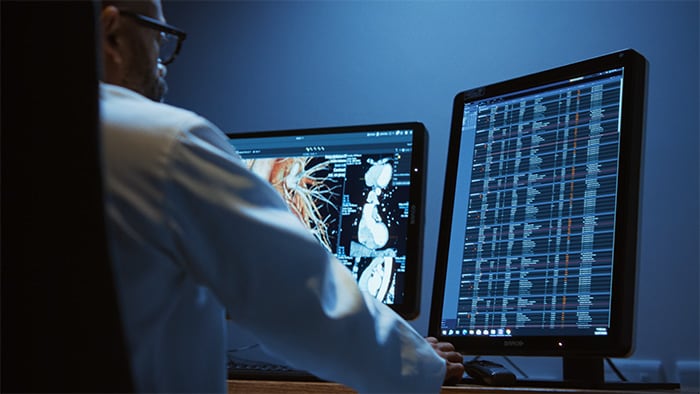Ever since I started working in the healthcare sector, I’ve learned one thing – the earlier you can diagnose a disease the more chance you have of curing it, or at least mitigating its impact on the patient. When it comes to the health of the planet, on which all human health ultimately relies, the symptoms and the scientific evidence already point to a clear diagnosis – anthropogenic global warming. The increasing severity of extreme weather events, consistent with predictions made by climate scientists, is already having a dramatic impact on healthcare - in the heatwave of summer 2003 in Europe for example, more than 70 000 excess deaths were recorded . However, while climate change is impacting healthcare, healthcare is also impacting climate change. Few people realize that the world’s healthcare systems account for 4% of global CO2 emissions, more than aviation or shipping. In my view, this strong interdependence between healthcare and climate change represents a unique opportunity to act in a way that will both mitigate climate change and positively impact human health. The evidence suggests that mitigating climate change so that global warming remains below 2oC, the target set out in the Paris agreement, would have a positive effect on people’s health. The necessary reduction in CO2 emissions from fossil fuels, together with the associated reduction in short-lived climate pollutants (SLCPs), such as black carbon particulates and nitrous oxides that increase tropospheric ozone, would prevent millions of deaths from respiratory disease. Encouraging people to eat more fruit and vegetables and less meat, something that each of us can do to reduce our carbon footprint, would result in reductions in heart disease, obesity, diabetes and cancer. Even the economics add up. The resulting savings in healthcare costs would outweigh the cost of the climate change mitigation and adaptation measures needed to stay below the 2oC threshold. Limit global warming to 1.5°C or less and the world could also continue to meet the UN Sustainability Goals, especially those related to eradicating poverty and reducing inequality. In terms of SDG3: ‘Ensure healthy lives and promote well-being for all at all ages’ it would make it much easier to build climate-resilient healthcare systems. We could continue to leverage telehealth to improve access to care, reduce healthcare’s carbon footprint, and provide early warnings of health risks due to climate-related events such as heatwaves and the spread of infectious diseases. If, as we know, on the other hand, warming is allowed to exceed 2°C, the implications for human health could be catastrophic. Building climate-resilient healthcare systems requires stable socio-political structures, institutions and infrastructures that could easily break down in a post 2oC world. Conflict, forced migration, poverty and malnutrition are all bad for people’s physical and mental health. Yet with rising sea levels and more frequent extreme weather events, all three could be inflicted on a significant proportion of the world’s population. The biggest impact will be on disadvantaged and vulnerable communities unable to buy themselves out of the problems.
First do no harm
Hospitals, health services and medical supply chains across the world’s major economies currently generate around 4% of global CO2 emissions. They are also a significant emitter of short-lived, yet potent, climate pollutants such as black carbon, methane, hydrofluorocarbons and anaesthetic gases. For an industry based on the principle of ‘first do no harm’, it’s therefore imperative that the healthcare industry acts quickly, collectively and globally to mitigate its own climate impact. We cannot wait for national policies, which will inevitably develop at different rates with different agendas, to set the pace of change. We need to globally unite, do it quickly and lead by example, developing best-practice international guidelines and standards for sustainable, climate-resilient healthcare development in the same way that our healthcare professionals develop best-practice guidelines for treating patients. It’s going to need technology innovation, outside-the-box thinking and multi-disciplinary multi-sector collaboration the like of which has not been seen before in the industry.
Speak up
Until recently, the healthcare sector has not enjoyed a loud enough voice in the climate change debate. Yet two things mark out why it has a lot to say. Firstly, the entire healthcare industry is based on a ‘duty of care’, and secondly, anyone who works at the frontline of healthcare delivery has seen for themselves the impact that poor health has on people’s lives. In terms of action on climate change, few if any industries are as free from vested interests, potentially stranded assets or political bias, and few are as committed to evidence-based decision making. The good news is that its voice is beginning to be heard. In last year’s Call to Action on Climate and Health, organizations representing over five million doctors, nurses and public health professionals and 17 thousand hospitals in over 120 countries made commitments to accelerating climate change mitigation and adaptation. One of those commitments was to use renewable electricity to power their facilities. It’s a milestone Philips has already achieved in its North America and Netherlands operations, which we achieved by disrupting the accepted generator-supplier-consumer value chain.
Act now
‘Greening’ the healthcare industry will involve myriad other initiatives such as the intelligent use of low-carbon technologies, low-carbon building design and construction, greater energy efficiency, sustainable waste, water, transport and anaesthetics management, and greater use of telemedicine. It will require low-carbon supply chains based on circular economy solutions that minimize raw material extraction and greenhouse gas emissions. Many of the lessons that need to be learned, such as implementation of circular economy solutions that reduce raw materials consumption, are cross sectoral. As a founding partner in PACE, the Platform for Accelerating the Circular Economy, Philips has already committed to recycling and/or repurposing all large capital equipment (medical systems) that our customers are prepared to return to us. By 2020 we will be carbon neutral. By 2025, as part of the Global Plastics Action Partnership, we will quadruple our use of recycled plastic to 7600 tons, recycle 90% of our operational waste and send zero waste to landfill – changes that require stakeholder engagement throughout the entire value chain.
With its highly complex and diverse supply chains and 8 trillion US dollar global purchasing power, healthcare has the ability to pull climate mitigation 'levers' across many different sectors.
Robert Metzke
Philips Global Head of Sustainability
Embrace change
With its highly complex and diverse supply chains and 8 trillion US dollar global purchasing power, healthcare has the ability to pull climate mitigation 'levers' across many different sectors. Upstream in areas such as plastics, pharmaceuticals, chemicals and paper production. Downstream in areas such as e-waste recycling and clinical waste disposal, and day-to-day in operational areas such as energy supply and food sourcing. It’s also an industry with one of the biggest vested interests in maintaining biodiversity as a valuable source of new drugs and antibiotics. Healthcare is also one of the world’s most technologically advanced sectors, highly adept at recognizing and exploiting the benefits technology can bring to patients. In little over ten years it’s driven a 100-fold decrease in the cost of genome sequencing, helping to diagnose and treat diseases such as cancer. It’s using the latest secure communication, cloud-based computing and artificial intelligence technologies to create connected care solutions that monitor and follow patients through every stage of the care cycle. It’s connecting remote and under-resourced communities to world-class clinical expertise on the other side of the world. There’s already a social enterprise initiative in Rwanda exploiting the telehealth capabilities of Philips’ Lumify portable ultrasound solution to allow expert sonographers in the US to teach local Rwandan doctors how to use ultrasound as a diagnostic tool. Thanks to remote intensive care monitoring technology, patients in intensive care units in the US are already being monitored overnight by wide-awake clinicians in Australia.
Lead by example
The level of expertise, cooperation and commitment needed to bring about these transformations can only be achieved through long-term partnerships that co-create solutions and evolve them in response to changing environments. Whether it’s mitigating climate change or improving access to quality care, the healthcare sector needs to lead by example. It should apply its dictum of ‘first do no harm’, and the ethical standards its practitioners commit to in the Hippocratic Oath, as much to the planet as it does to its patients. The good news is that if it applies those principles to mitigating the worst effects of climate change, improved human health comes as an added bonus. Together, through innovation, responsible leadership and cooperation to create sustainable climate-resilient ecosystems, we can not only combat climate change, we can expand access to quality healthcare and improve health outcomes for all.
Share on social media
Topics
Author

Robert Metzke
Philips Global Head of Sustainability Mr. Metzke leads Philips’ activities in Sustainability where he drives the company’s strategy towards innovative, sustainable business models and embedding sustainable and circular ways of working across Philips. In particular, Robert and his team are leading all activities with regards to Philips' environmental responsibility, with a focus on climate action, circular economy and expanding access to healthcare in underserved communities, as part of Philips overall purpose to improve people's health and well-being. Before joining Philips, Mr. Metzke worked at McKinsey & Company as a consultant where he gained 5 years of experience in strategy and innovation in the high-tech, healthcare and public sectors. Mr. Metzke has a background in journalism, science publishing (Science/ AAAS) and academic research (physics). He is married, has three children and lives in the Netherlands.
Follow me on













